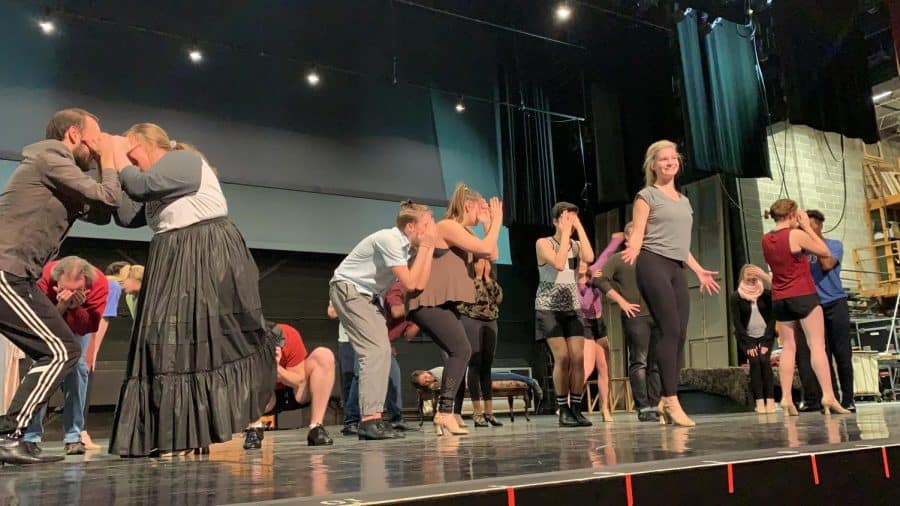Swinging roles provide real-world experience
February 21, 2019
As UA Theatre and Dance presents “The Drowsy Chaperone” this week, it is easy to see only the characters on stage. The big musical numbers, the parodies of musical tropes that leave the audience rolling in laughter and even the charming narrator may keep a viewer from turning to the two small biographies at the end of the cast list.
Known in the industry as swings, these performers become accustomed to working away from the spotlight. They often learn several ensemble or supporting roles for a production. In case of sickness during rehearsals or show week, swings can fill in wherever they are needed.
“In this show, we have both understudies and swings,” musical theatre director Stacy Alley said. “Understudies are usually in the ensemble and cover supporting or lead roles. But if the understudy is called up for whatever reason, then the swing will go in for the ensemble role.”
Ally Bryant, a junior double majoring in musical theatre and philosophy, and Will Harden, a sophomore majoring in musical theatre, served as the female and male swings for “The Drowsy Chaperone.” Each of them had to learn the entirety of the choreography of four to five ensemble members.
“Sometimes we’d wonder how in the world we were going to figure out everyone’s places,” Harden said. “But for one run through, we’d focus on one person and learn all of their part, and for the next, we’d focus on a different person, because it was impossible to look at the whole stage at once.”
Swinging for a production can seem like a thankless job to those outside the theater. Working hard on roles they likely won’t perform can be disappointing, Bryant said.
“The general consensus from audiences might be, ‘Well, maybe [the swings] just weren’t good enough for the role,’” Bryant said. “But swings do so much work without the recognition. I’ve learned that we don’t need that. If we needed to go in for someone, we could, and that’s an accomplishment in itself.”
Still, not being cast in a main role can feel like a bit of a setback at first. Though it wasn’t Harden’s first time as a swing, this show was different.
“This was the first semester I didn’t get any callbacks and didn’t get cast in a show,” Harden said. “It was a tough process through that week where all my friends were getting callbacks, and I thought, ‘This isn’t happening.’”
It was Bryant’s first experience as a swing actor. Thoughts of her parents not seeing her perform this semester entered her mind when she first learned she wasn’t cast in a show.
“There is a little sting that comes with it,” Bryant said. “To me, finally performing a show was why you went through the whole rehearsal process, to be able to show your friends and family what you’ve been working on.”
But as the show progressed, both swings came to recognize the value of their part. Bryant and Harden found themselves filling roles in rehearsals during a wave of sickness that hit the cast.
“There’s so much timing and choreography in this show, onstage as well as backstage,” ensemble member Christian Hatcher said. “Getting all that timing down in rehearsals means that someone needs to be rehearsing those tracks all the time. If one person is missing, everyone’s formations will be off… During two of our set rehearsals, I ended up getting sick, and Will came on for me.”
Serving as a swing has become a large part of their practical, career-based education, Bryant and Harden said. They said their capabilities were tested in ways that made them feel more prepared to be professionals.
“This department does really well with swings,” Harden said. “A lot of different people get the chance to be swings, and the faculty is always telling us, ‘If you can swing, you’ll have a job forever.’ In the industry, swings are in demand because not everyone can swing several roles, but people may also give you a different role because they know they can trust your work ethic.”
It is no small compliment to be cast as a swing. Alley said she looks for people who are smart and enjoyable to work with. Trust plays a large role in selecting someone to cover multiple ensemble parts.
“I know that Ally Bryant is a hard worker, that she’s on her game, that she’s drama free,” Alley said. “I hadn’t worked with Will Harden before, but I thought he would be a great ensemble member and I wanted to give him that educational experience. I look for people that have good attitudes and perform well under pressure.”
Students and recent graduates can often get discouraged by the cutthroat, competitive nature of professional theater. However, swinging roles can be a breakthrough job for an actor or actress trying to make it on Broadway.
Tony Award-winning actress Karen Olivo of “West Side Story,” “In the Heights” and Chicago’s production of “Hamilton” began her career behind the scenes. Her first shot came when she was hired as a swing for the original Broadway run of “Rent” in 1996.
“Throughout this process, we’ve been hoping our hard work we put into this show, even as swings, will transfer into the real world,” Bryant said. “I think all of us as actors hope someone is going to notice us, because you need talent and hard work, but at a certain point you just have to love what you’re doing. That love just has to become a hope that your career will take off and that you’re going to make it somehow. ”
“The Drowsy Chaperone” will be playing in the Marian Gallaway Theatre at 7:30 p.m. until Saturday, Feb. 23. For tickets, visit www.ua.tix.com.





















